What is a TERF? Debate over transgender rights and Gender Recognition Act explained
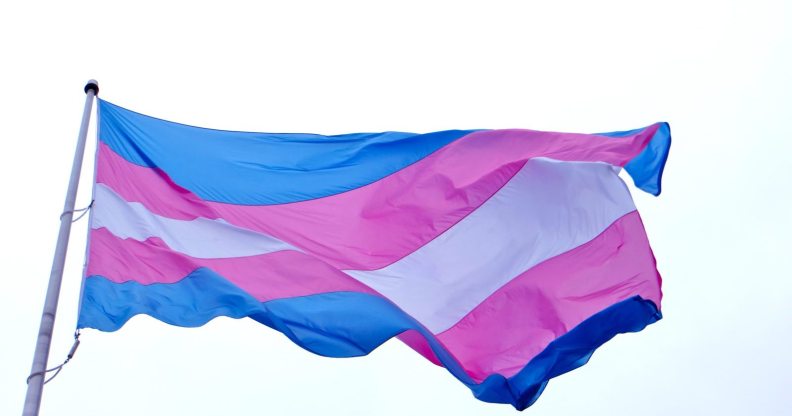
The trans flag (Creative Commons)
Google searches for the term “TERF” in the UK are at an all-time high, and are only projected to increase. A look at Google Trends shows that most of the queries relate to understanding whether a certain celebrity is considered a TERF and, most importantly, what exactly the term means.
TERF is an acronym that stands for trans-exclusionary radical feminist. TERFs believe in a radical feminism that narrows down the definition of a woman to their birth sex. In doing so, TERFs negate transgender individuals’ legitimacy in their self-identification and, specifically, deny trans women access to women-only spaces.
Among the arguments expressed in TERF spaces, there is belief that trans women can never be fully considered women because of the male privilege experienced from birth—an argument that actor Laverne Cox elegantly put to bed last year—and that they represent a threat to cisgender women because of the male genitalia with which they were born.
TERF arguments generally give so-called “biology” precedence over “gender,” which is rejected as a social construct. But they fail to recognise that the understanding of how gender identities and biology intertwine is still being explored and new research suggests that gender identity is wired in the mind. A recent study, titled “Brain structure and function in gender dysphoria,” found that transgender people’s brains are wired similarly to those of their “experienced gender rather than birth sex.”
The beliefs denoted by the acronym “TERF” have long been part of both the feminist and gay rights movements for decades, as The New Yorker noted in 2014. It was only that year that the term began appearing in the mainstream—around the time Time magazine chose Cox as the first transgender person to grace its cover.
Most people labeled TERFs by trans activists reject the label and prefer defining themselves as “gender-critical,” or “radical feminists.” Both terms conveniently conceal the exclusionary elements of their beliefs, which propose to deny basic human rights.
Is TERF a slur?
One of the debates surrounding the term TERF focuses on whether the term is an offensive slur on par with homophobic and racist insults—which aim to stigmatise people on the basis of who they are and how they look—rather than a description of a set of beliefs, such as “racism.”
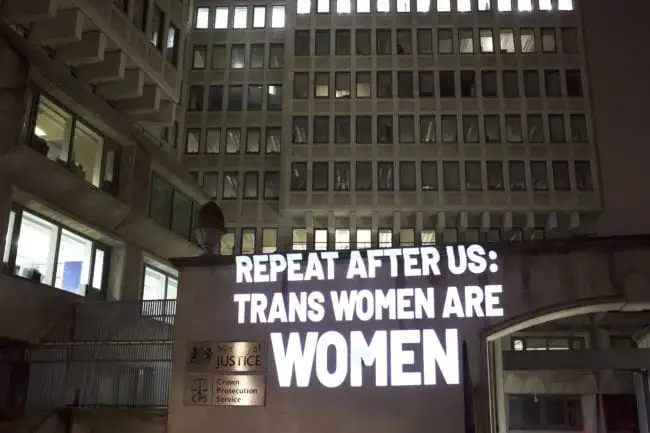
- ‘Repeat after us: Trans Women are Women’ was projected onto the side of the Ministry of Justice (Courtesy Dazed)
It’s hard to disagree with the claim that TERF has assumed a negative connotation, but this has to do more with the nature of the beliefs defined by the word, than the word itself. Another question is whether the term is necessary to describe and challenge transphobic views? While all trans-exclusionary feminists are transphobic by definition, not all transphobia is perpetrated by TERFs.
The Economist, which recently published a 10-part series of essays on transgender identities, sided with those recognising TERF as a slur, banning it from its articles because the word “may have started as a descriptive term but is now used to try to silence a vast swathe of opinions on trans issues, and sometimes to incite violence against women.”
What about violence against women?
Citing “violence against women” is a common trope used by those who want to cast a sinister light on the trans rights movement. One such example is the petition against the San Francisco Public Library (SFPL) exhibition of protest symbols used by the Northern California Degenderettes group, which describes itself on Facebook as “a friendly international feminist & genderqueer agitprop club.”
The event featured blood-soaked tank tops reading, “I punch TERFs” and “Your apathy is killing us,” and baseball bats painted in the colour of various LGBT+ flags, which were originally created following the 2016 Pulse nightclub shooting and inspired by Beyoncé’s “Hold Up” video.
But the petition, started by a person using the nickname of Scout Finch, the main character in the beloved novel To Kill a Mockingbird, mischaracterised the artwork as “weapons intended to kill feminists,” taking the artefacts out of the context for which they were created—defiant support of trans people’s right to exist.
“The Degenderettes blend aesthetics and praxis in order to foreground their right to exist in a world where Queer and Trans people are continually threatened with erasure,” a statement from the SPLF advertising the exhibition read.
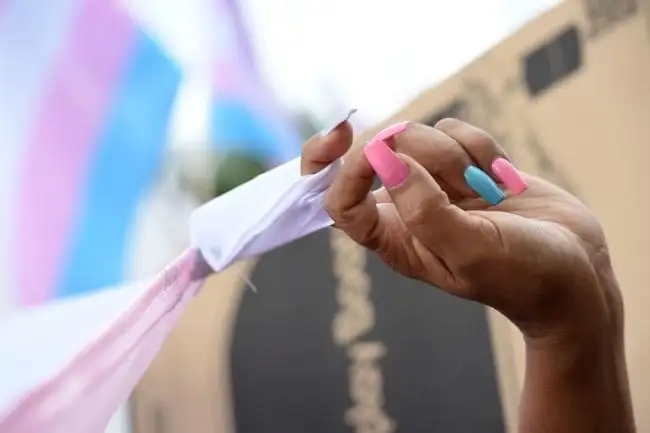
- A marcher has their fingernails painted in the pink and blue transgender community colors at the Los Angeles Gay Pride Resist March, June 11, 2017 in Hollywood, California
(Robyn Beck/AFP/Getty)
In the UK, the case of transgender activist Tara Wolf’s conviction for assaulting radical feminist Maria Maclachlan during a protest in London’s Hyde Park in 2017 is now commonly referenced as evidence of point-blank trans violence against women.
This narrative removes the episode from its context—a wider confrontation between groups that appeared aggressive towards one another—and the widespread condemnation it received from several trans writers and activists.
As reported in the Evening Standard, the judge presiding the case remarked on the “antagonistic” language used by both groups—in fact, he called the term TERF “strong”—but refused to award compensation to Maclachlan, citing the “unhelpful way” in which she behaved during the protest, on social media, and in court. Maclachlan refused to address Wolf by her preferred pronouns despite the judge’s request to do so.
Trans-exclusionary radical feminists take issue with what they call “violent rhetoric” associated with the use of the word TERF, but they fail to apply those standards to their own ranks, often insulting and abusing those who disagree with their views.
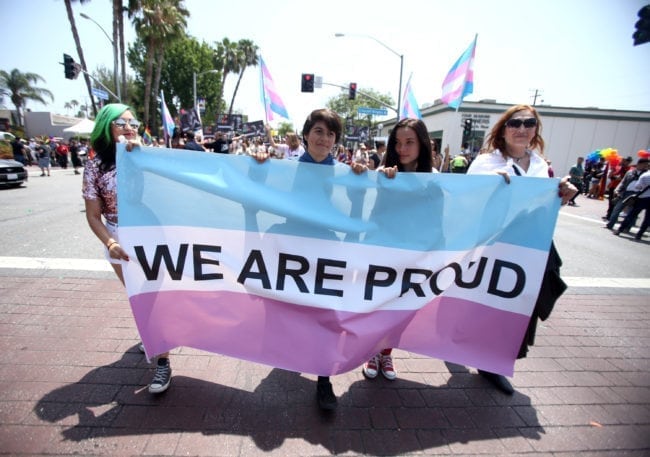
- Participants celebrate with Amazon at Pride (Tommaso Boddi/Getty)
In her essay published as part of the aforementioned Economist series, University of Leeds Professor Sally Hines describes being targeted by anti-trans campaigners.
“For politely disagreeing with their views, I have been harassed by anti-trans campaigners who threw aside feminist principles to bizarrely accuse me of supporting rape by being trans-inclusive, of having an ugly man’s face, and of not really being a woman because I am a professor. As women publicly debated my appearance and my genitals on Twitter, I experienced a small degree of the dehumanisation trans people are daily subjected to,” she wrote.
“Anti-transgender feminism needs to be explicitly recognised as being in breach of the goals of equality and dignity. Indeed, anti-trans feminism must be held up as a doctrine that runs counter to the ability to fulfil a liveable life or, often, a life at all,” she concluded.
The Gender Recognition Act debate
The issue of trans rights in the UK has only gotten more incendiary—and, at times, confusing—since the government opened a public consultation with the view to reform the 2004 Gender Recognition Act.
The 2004 Gender Recognition Act was the first piece of legislation that officially recognised transgender people. However, it imposes a bureaucratically heavy and medically intrusive process by which a person can legally change their gender.
Changes to the law would recognise non-binary people, as well as make it legally easier for trans people to change their gender under statutory oath. This would be made available to those aged 16 and above (and with parental consent below 16).
TERF arguments claim that self-identification would put cis women in danger of cis men fraudulently changing their legal gender and trans individuals at risk of regretting their choice.
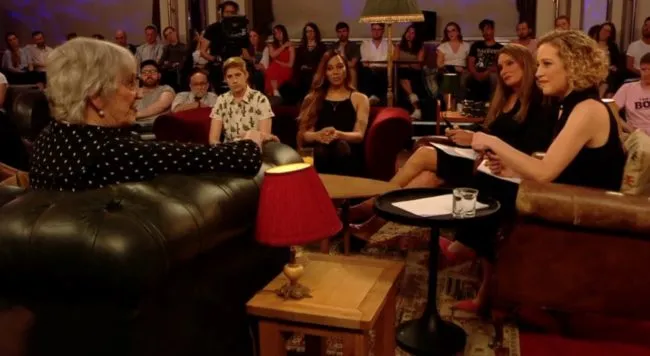
- Host Cathy Newman and Germaine Greer (Channel 4)
When Channel 4 attempted to discuss the reform in the controversial program Genderquake: The Debate, trans rights activists like Caitlyn Jenner and Munroe Bergdorf were often interrupted and heckled by members of the audience who repeatedly yelled “penis” at them.
During the programme, changes to the Gender Recognition Act were discussed in the same breath as trans people’s rights to access female-only spaces, such as restrooms or shelters, despite them being given the legal right to do so already in the 2010 Equality Act.
“We often seem to forget that the Gender Recognition Act and the Equality Act are not the same thing. Even if we were to have a conversation as to whether or not self-identifying into single-gender spaces was likely to [lead to] abuse, that’s nothing to do with self-determination for gender recognition,” Peter Dunne, a lecturer in Law at University of Bristol Law School who has written extensively about trans rights in UK and European legislations, told PinkNews.
In countries that already allow self-identification of legal gender (Argentina, Malta, Denmark, Ireland, Norway, Sweden, Colombia and Belgium), Dunne has yet to come across a case of the process being used for fraudulent or abusive purposes.
“The lack of reported cases shows that, to a certain extent, the idea that we should hold off on self-determination in terms of legal gender recognition in order to prevent this type of abuse is a solution in search of a problem, in that it is not a problem we actually see happening,” Dunne said.

- The cast of Orange is the New Black, set in a female prison and featuring a prominent storyline about the trans woman inmate played by Laverne Cox (Netflix)
Yet several of the articles published in national publications have focused around trans women’s access to cis women-only spaces.
“Are female prisoners at risk from transgender inmates?” The Spectator asked in a blog post last week. Similar concerns were raised in Guardian columnist Hadley Freeman’s piece from 2017 giving space to dubious claims reported in the tabloid press that murderer Ian Huntley “wished to be known as Lian Huntley and be transferred to a women’s prison.”
Refuting these arguments as using the “awful behaviour of a handful of people to undermine an entire and diverse community,” transgender activist and journalist Paris Lee pointed out in the i newspaper that, while cis people discussed the hypothetical threat of trans women, the cases of violence experienced by trans prisoners held in jails that didn’t match their experienced gender were real, and ongoing.
“Trans people are literally sick to death of having debates about the problems we might cause the rest of society at the expense of discussing the very real violence and discrimination that trans people around the world suffer every day,” she wrote.
It is also worth remembering that it was the death of trans woman Vicki Thompson, who was held in a men-only jail due to a lack of gender recognition certificate, that first prompted the government to consider changes to the Gender Recognition Act in 2015.
The story has been updated to correct the name of the change.org petitioner to Scout Finch.

